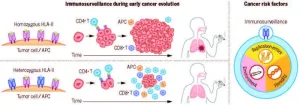(Press-News.org) Join Gunther Eysenbach, the founder, CEO, and executive editor of JMIR Publications, in this new video as he reflects on the company's 25th anniversary and its remarkable journey in the scholarly publishing industry. Eysenbach discusses the inception of the Journal of Medical Internet Research and the driving forces behind creating an open access eHealth journal. He emphasizes the significance of innovation both in content and form, highlighting the company's early adoption of internet-based technologies and its commitment to optimizing processes for online publishing.
The conversation delves into the evolution of medical research and technology over the past two and a half decades, with Eysenbach tracing the shifts in terminology from cyber medicine to digital health. He discusses the company's role in fostering rigorous research standards and pioneering the integration of social media metrics in assessing scholarly impact, demonstrating a commitment to advancing the field.
Eysenbach shares memorable success stories, notably the pivotal role of JMIR Publications during the COVID-19 pandemic, where digital health solutions gained unprecedented prominence. He also discusses the company's contributions to disciplines like infodemiology and participatory medicine, underscoring its commitment to empowering individuals through accessible health information.
The interview explores challenges faced by the company, including navigating the conservative indexing practices of scholarly databases and adapting to the changing landscape of open access publishing. Despite these hurdles, Eysenbach emphasizes perseverance and belief in the mission as critical factors for success.
Finally, the conversation touches upon the future of scholarly publishing, envisioning a shift toward communities and innovative peer-review models. Eysenbach highlights JMIR Publications’ initiatives like the JMIRx series, which pioneers new approaches to peer review and publication. He underscores the company's commitment to driving forward-thinking innovations in the field.
The interview paints a vivid portrait of JMIR Publications as a mission-driven organization that has played a pivotal role in shaping the landscape of digital health research and scholarly publishing. Eysenbach's insights highlight the company's unwavering dedication to advancing the field through innovation, collaboration, and a steadfast commitment to its core values. As JMIR Publications celebrates its 25th anniversary, it stands poised to continue its transformative journey, driving forward-thinking initiatives that will shape the future of scholarly publishing for years to come.
About JMIR Publications
JMIR Publications is a renowned publisher with a long-standing commitment to advancing digital health research and progressing open science. Our portfolio includes a wide array of prestigious open access, peer-reviewed journals dedicated to the dissemination of high-quality research in the field of digital health. JMIR Publications is celebrating its 25th anniversary in 2024 as the leading open access digital health publisher.
END
JMIR Publications celebrates 25 years of publishing health research
2024-02-22
ELSE PRESS RELEASES FROM THIS DATE:
How discrimination, class, and gender intersect to affect Black Americans’ well-being
2024-02-22
URBANA, Ill. – Black Americans experience racial discrimination as a chronic stressor that influences their quality of life. But it exists in conjunction with other social factors that may modify the impact in various ways. A new study from the University of Illinois Urbana-Champaign explores how discrimination, gender, and social class affect individual well-being and relationship quality for Black Americans.
“It’s well documented that discrimination negatively impacts individual quality of life, but research on how it affects relationships is mixed. Some studies find it has a negative effect, others that it has no effect, and some even find a positive effect, ...
Compound vital for all life likely played a role in life’s origin
2024-02-22
Compound vital for all life likely played a role in life’s origin
A chemical compound essential to all living things has been synthesised in a lab in conditions that could have occurred on early Earth, suggesting it played a role at the outset of life, finds a new study led by UCL researchers.
The compound, pantetheine, is the active fragment of Coenzyme A. It is important for metabolism - the chemical processes that maintain life. Earlier studies failed to synthesise pantetheine effectively, leading to suggestions that it was absent at life’s origin.
In the new ...
Study reveals new insights into immune system role in lung cancer risk
2024-02-22
New York, NY (February 22, 2024)—Recent developments in cancer research have highlighted the vital role of the immune system, particularly in the notable successes of cancer immunotherapy.
Now, a paradigm-shifting study led by researchers at the Icahn School of Medicine at Mount Sinai in New York in collaboration with the University of Helsinki and Massachusetts General Hospital sheds light on how variations in immune genetics influence lung cancer risk, potentially paving the way for enhanced prevention strategies and screening.
The findings were described in the February 22 online issue of Science [DOI number: 10.1126/science.adi3808].
The investigators ...
New Cedars-Sinai study pinpoints why some injured kidneys do not heal
2024-02-22
Cedars-Sinai investigators have discovered why some injured kidneys heal while others develop scarring that can lead to kidney failure. Their findings, detailed in a paper published in the peer-reviewed journal Science, could lead to the development of noninvasive tests to detect kidney scarring and, eventually, new therapies to reverse the condition.
“The key to this discovery was our ability to directly compare injured kidney cells that successfully regenerated with those that did not,” said Sanjeev Kumar, MD, PhD, a nephrologist-scientist in the Board of Governors Regenerative Medicine Institute and the Department of Medicine at Cedars-Sinai and senior author ...
Moving “beyond Mendel” in genetics education can reduce racism, new study suggests
2024-02-22
Data from a series of randomized trials in the United States suggests that if teachers move genetics instruction toward more complex genomics concepts, they can help students have a more scientifically accurate understanding of race. This can protect students from believing in unscientific notions of genetic essentialism, including the idea that inequality is genetic. People who believe in genetic essentialism believe – among other ideas – that most racial differences are determined by genes. Essentialist ...
Uncovered with JWST: A neutron star in the remnant of Supernova 1987A
2024-02-22
Astronomers using the James Webb Space Telescope (JWST) have found conclusive evidence of a neutron star in the remnant of Supernova 1987A, the only supernova visible to the naked eye in the last 400 years and the most studied supernova in history. Although Supernova 1987A has been observed for more than three decades, scientists have not seen the compact object expected to have been produced during the explosion. Some indirect evidence had suggested that the supernova produced a neutron star, but a black hole wasn’t ruled ...
Chemistry and albedo feedbacks offset forestation’s net climate benefits
2024-02-22
Roughly a third of the climate cooling that forests achieve by removing carbon dioxide (CO2) from the atmosphere is offset through changes to atmospheric composition and decreased surface reflectivity, researchers report. The findings suggest that the benefits of wide-scale forestation efforts may be overestimated and do not represent a single solution for addressing climate change. They also highlight the urgency of simultaneously focusing on emissions reductions. Planting trees has been widely promoted as a nature-based solution to remove anthropogenic CO2 from the atmosphere to help mitigate ...
Snakes do it faster, better: How a group of scaly, legless lizards hit the evolutionary jackpot
2024-02-22
More than 100 million years ago, the ancestors of the first snakes were small lizards that lived alongside other small, nondescript lizards in the shadow of the dinosaurs.
Then, in a burst of innovation in form and function, the ancestors of snakes evolved legless bodies that could slither across the ground, highly sophisticated chemical detection systems to find and track prey, and flexible skulls that enabled them to swallow large animals.
Those changes set the stage for the spectacular diversification of snakes over the past 66 million years, allowing them to quickly exploit new opportunities ...
Side effects of wide scale forestation could reduce carbon removal benefits by up to a third
2024-02-22
The side effects of large-scale forestation initiatives could reduce the CO2 removal benefits by up to a third
Researchers at the University of Sheffield used computer models, which simulate the land, ocean and atmosphere, to investigate the impact of forestation under future climate scenarios
While forestation increases atmospheric CO2 removal, it also changes atmospheric composition and darkens the land surface, reducing its potential to tackle climate change
Combining forestation with other climate mitigation ...
Yale chemists synthesize unique anticancer molecules using novel approach
2024-02-22
New Haven, Conn. — Nearly 30 years ago, scientists discovered a unique class of anticancer molecules in a family of bryozoans, a phylum of marine invertebrates found in tropical waters.
The chemical structures of these molecules, which consist of a dense, highly complex knot of oxidized rings and nitrogen atoms, has attracted the interest of organic chemists worldwide, who aimed to recreate these structures from scratch in the laboratory. However, despite considerable effort, it has remained an elusive task. Until now, that is.
A team of Yale chemists, writing in the journal Science, ...


